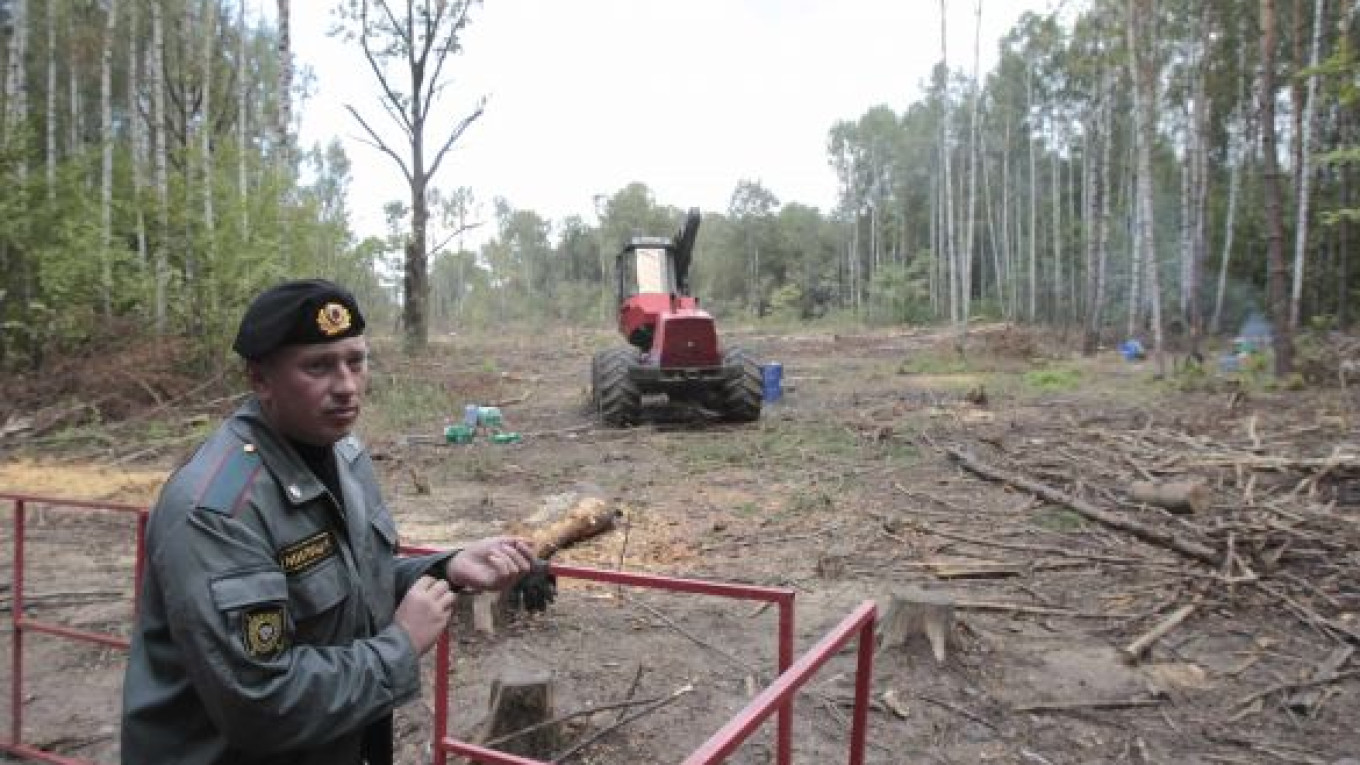In a rare reversal, Prime Minister Vladimir Putin has backed down on his opposition to halting the construction of an $8 billion highway through a centuries-old oak forest north of Moscow — even as loggers said they already cut down almost half of the trees in question.
Putin said he was open to an alternative route Friday, a day after President Dmitry Medvedev ordered a halt to the deforestation needed to make way for the highway from Moscow to St. Petersburg.
“The question about what route the road will take is an important one,” Putin told reporters during a tour of the Far East, according to a transcript on the government’s web site.
But he also said the highway was a “necessary” project.
Meanwhile, Teplotekhnik, the contractor hired to clear the forest, said it had cut down about 60 hectares of the 144 hectares scheduled for destruction, Vedomosti reported Friday.
Putin and Medvedev made no public comment about Teplotekhnik’s announcement by Sunday.
Yevgenia Chirikova, leader of the Khimki forest defenders, told The Moscow Times that restoring the destroyed trees would take more than 70 years.
Putin’s government previously supported the partial destruction of the forest. But speaking to reporters Friday, Putin stressed that this was not the first time that he had changed previously approved construction plans because of environmental concerns.
He said he was referring to Transneft’s Siberian pipeline, which he personally ordered to be moved from Lake Baikal’s shores ahead of its construction in 2006.
Alternative routes for the highway are to be discussed at public hearings this week. But activists fear that the initial route might still win out.
“I fear that the result of the hearings will be predictable: The ‘right’ people will stand by their decision [to destroy the forest], and both the prime minister and the president will agree with those experts,” said Gennady Rodin, one of the forest’s defenders.
He said Khimki City Hall was pressuring local businessmen and state employees to sign a petition in support of the deforestation.
The government could consider two possible routes that have been drawn up for the highway and that go around the Khimki forest, said Mikhail Blinkin, an expert with the state Transport and Road Infrastructure Research Institute.
One route runs parallel to the railroad from Moscow to St. Petersburg, and the other passes through the Molzhaninovsky district in northern Moscow, he said.
“Both are more expensive,” Blinkin said, adding that the first route will require resettling about 30,000 residents, while the other involves paying companies that lease land in the area.
The Molzhaninovsky route was considered by the authorities in 2006 but dropped because Inteko, the company owned by Mayor Yury Luzhkov’s wife, Yelena Baturina, was planning to develop the district, Vedomosti reported Friday, citing an unidentified source close to the state company Russian Roads. Inteko abandoned the plans last September, the report said.
A Message from The Moscow Times:
Dear readers,
We are facing unprecedented challenges. Russia's Prosecutor General's Office has designated The Moscow Times as an "undesirable" organization, criminalizing our work and putting our staff at risk of prosecution. This follows our earlier unjust labeling as a "foreign agent."
These actions are direct attempts to silence independent journalism in Russia. The authorities claim our work "discredits the decisions of the Russian leadership." We see things differently: we strive to provide accurate, unbiased reporting on Russia.
We, the journalists of The Moscow Times, refuse to be silenced. But to continue our work, we need your help.
Your support, no matter how small, makes a world of difference. If you can, please support us monthly starting from just $2. It's quick to set up, and every contribution makes a significant impact.
By supporting The Moscow Times, you're defending open, independent journalism in the face of repression. Thank you for standing with us.
Remind me later.


